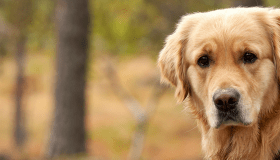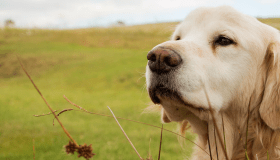
May 5, 2022 – The offices of Morris Animal Foundation in Denver are dog friendly, and staff members are often accompanied by their furry work companions. So, we’re used to seeing, petting and, yes, spoiling our office dogs. Even with that dog abundance, a visit from Gail Ingrish and her two hero dogs was always a special treat for everyone at the Foundation.
Hero dogs Nellye (#24) and Wrigley (#22) would burst into the office, usually dragging Gail behind, and run from person to person, greeting everyone with a wag and a lick. Nellye would show off her latest tutu and Wrigley would handsomely smile at everyone. We loved it.
Gail found out about the Study by accident. She happened to be in the Foundation office for a meeting of another charitable group when she noted some odd markings on a white board.
“In one corner was the random number 3,000; in another corner the word ‘cancer,’” said Gail. “I saw the words ‘golden retriever’ in a third corner and just had to ask what it all meant.”
Gail learned that the first pilot dogs were being recruited for a first-of-its-kind study and Gail knew she was in. Both Nellye and Wrigley were part of the pilot group of dogs enrolled in June 2012.
Gail jumped into the Study with her usual energy and enthusiasm. She has volunteered in too many roles to count in the last 10 years. She’s been a tremendous source of support for countless participants.
Gail moved to her beloved New Orleans a few years ago but was quick to share the latest pictures of her dogs “doing their thing” in the Big Easy. Unfortunately, like so many other Study participants, Gail lost Wrigley to hemangiosarcoma in June 2020. Nellye succumbed to chronic kidney disease just over a year later.
Despite losing Nellye and Wrigley, Gail remains a tireless volunteer for the Study. Gail was instrumental in the formation of the 3000 CARES group, the 3000 HEARTS group and the EMBRACE 3000 Facebook page. Gail also is involved with a new program called the Wrigley Factor, which provides information for participants on how to address end-of-life care requirements of Study dogs, including the difficult and emotion decision-making around necropsy.
Even through her own losses, and those of so many close friends in the Study community, Gail is excited to see what happens as the next couple years brings the Study to its research endpoints of 500 cancer diagnoses (in hemangiosarcoma, lymphoma, osteosarcoma and mast cell tumor).
“I think we’re going to find new research pathways to travel,” said Gail. “Of course, I’m hoping we learn more about cancer and I think we will. I also believe we’ll find genetic or nutritional or environmental associations with disease we never even dreamed of back when the Study started!”
The Study family thanks Gail for all her hard work and dedication, and we want to extend that thanks to all our participants. Researchers around the world point to the incredible retention and compliance statistics we’ve achieved with your help. Thanks again to Gail and to everyone for making the Study a success!




